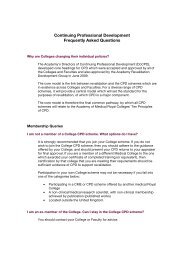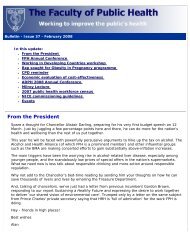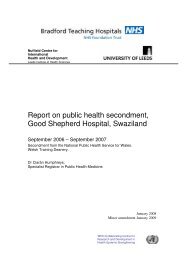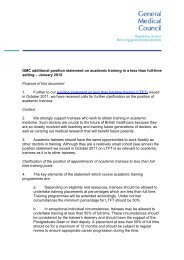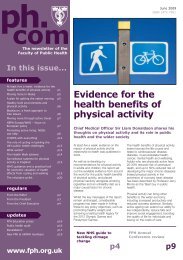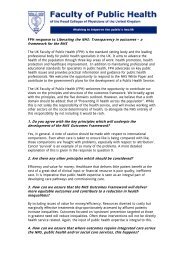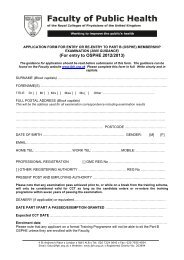December Edition â Happiness - UK Faculty of Public Health
December Edition â Happiness - UK Faculty of Public Health
December Edition â Happiness - UK Faculty of Public Health
- No tags were found...
Create successful ePaper yourself
Turn your PDF publications into a flip-book with our unique Google optimized e-Paper software.
SPECIAL FEATURE: HAPPINESSEat your greens tobeat the blues?A RECENT analysis* has looked at therelationship between fruit and vegetableconsumption and mental health in threerobust, representative, cross-sectionalstudies <strong>of</strong> adults in England, Scotland andWales. Each survey gathered self-reportedintake data, measured in portions <strong>of</strong> up toeight or more a day, whereas most surveysstop at the recommended five or more.They also gathered data using differentmeasures <strong>of</strong> mental health – mentalwellbeing (WEMWBS), mental illness (GHQ-12), life satisfaction, happiness,nervousness and feeling downhearted.Together these surveys capturedinformation from more than 80,000 peopleand took account <strong>of</strong> factors such as age,sex, ethnic group, socioeconomic andeducational circumstances and otherlifestyle factors such as smoking. Theyshow a consistent dose-responserelationship between mental health andportions <strong>of</strong> fruit and vegetables consumed:the more fruit and vegetables consumedthe more mental wellbeing. In modelsbased on indicators <strong>of</strong> positive mentalhealth (WEMWBS, life satisfaction andhappiness) coefficients increased up toseven or more portions. In models basedon mental health problems (GHQ-12,nervousness, feeling downhearted) theyincreased up to five or more.While a strong and consistent doseresponserelationship, as shown in thesestudies, is pretty powerful evidence thatfruit and vegetable consumption isinfluencing mental health, the possibilityremains that the surveys could just bedocumenting the fact that people withThe more fruit andvegetables consumedthe more mental‘wellbeingbetter mental health tend to look afterthemselves better than those without.We already know that increasing fruitand vegetable consumption would meet awide range <strong>of</strong> public health goals includingreduced cardiovascular disease and cancer.If it could be shown that fruit andvegetable consumption make a differenceto wellbeing, public health messages toincrease consumption would be greatlyenhanced.If it could also be shown for certain thatfive portions a day is not optimal formental health, public health messageswould also need to change. With theevidence available from this study, it ispossible to claim that this is likely to be so,but we urgently need prospectivesupplementation studies to prove thingsone way or another.Sarah Stewart-BrownPr<strong>of</strong>essor <strong>of</strong> <strong>Public</strong> <strong>Health</strong>Warwick Medical School‘* Blanchflower DG, Oswald AJ, Stewart-Brown S. Is psychological wellbeing linkedto the consumption <strong>of</strong> fruit and vegetables?Social Indicators Research 2012 Epub 11October DOI10.1007s/11205-012-0173-yPutting moodson the mapTHE aim <strong>of</strong> ‘mood-mapping’ is to helppeople and groups understand, measure,compare and manage how they feel. Atpresent mood is measured withquestionnaires or on a scale using factorssuch as anxiety or wellbeing, depression orenergy. Mood-mapping is a visual, nonculturalassessment <strong>of</strong> mood that is easy tolearn and apply. It measures mood in themoment and can show how immediatecircumstances affect how a person feels.The technique separates mood intoenergy and positivity. The four quarters <strong>of</strong>the graph describe four basic moods: action,stress, tiredness and calm (see Fig). Theindividual plots their ‘mood point’ byestimating how much energy and howpositive they feel. The mood point can belabelled with the time and circumstances. Ifrequired, an intervention can be <strong>of</strong>feredand its effect on mood assessed.Numerous studies show the benefit <strong>of</strong>interventions and environment on health,wellbeing and energy levels. Moodmappingcan be used as a simple selfassessmenttool alongside five approachesto managing mood: the environment,physical health, relationships, cognitivestrategies and individually specific factorsto improve how people or groups feel(Miller L, <strong>Health</strong>care Counselling &Psychotherapy Journal 2011: 2; 17-19).Mood-mapping is a simple way <strong>of</strong>visualising how people feel andencouraging them to have greater control<strong>of</strong> their emotions, better understand howtheir actions affect their health and stresslevels, and take more responsibility for theirwellbeing. This self-help approach isespecially useful in times <strong>of</strong> austerity. Fromthe perspective <strong>of</strong> public health, the toolcould perhaps be validated to allow thehealth and stress levels <strong>of</strong> a population tobe measured and compared.Liz MillerGP and occupational health physicianREVALIDATIONRevalidation guideYour pull-out-and-keep manual for the new systemThere are a number <strong>of</strong> aspects <strong>of</strong> revalidation about which the <strong>Faculty</strong> <strong>of</strong> <strong>Public</strong> <strong>Health</strong> frequently receives queries from members. We’vedeveloped this pull-out-and-keep guide to give you the essential facts about revalidation. Working with colleagues in the field, we’vedeveloped this guidance to help those working as public health pr<strong>of</strong>essionals, as well as those appraising them. You can find this andfurther information on our website at: www.fph.org.uk/supporting_information_for_gmc_revalidationFROM THE VICE PRESIDENTIT HAS been a long time coming but, atlast, revalidation to the General MedicalCouncil (GMC) is about to commence.The regulations that bring revalidationinto our pr<strong>of</strong>essional lives were enabledon 3 <strong>December</strong> 2012.For most <strong>of</strong> you, there will be littlechange in your annual appraisals,merely a strengthening <strong>of</strong> existing localprocesses. For those <strong>of</strong> you not used toannual appraisals, which are the basis<strong>of</strong> revalidation, you will need t<strong>of</strong>amiliarise yourself with the requirements.These pages will help all readers toprepare for revalidation to the GMC, toensure they are aware <strong>of</strong> therequirements, the types <strong>of</strong> supportinginformation they will be required toreflect on and present at their annualMain types <strong>of</strong>supportinginformationAN IMPORTANT part <strong>of</strong> revalidation isthe building, over a period <strong>of</strong> five years, <strong>of</strong>a portfolio <strong>of</strong> supporting information thatdemonstrates your practice against the 12attributes <strong>of</strong> Good Medical Practice.The supporting information that you willneed to bring to your appraisal will fallunder four broad headings:n General information – providing contextabout what you do in all aspects <strong>of</strong> yourworkn Keeping up to date – maintaining andenhancing the quality <strong>of</strong> your pr<strong>of</strong>essionalworkn Review <strong>of</strong> your practice – evaluating thequality <strong>of</strong> your pr<strong>of</strong>essional workn Feedback on your practice – how othersperceive the quality <strong>of</strong> your pr<strong>of</strong>essionalwork.There are six types <strong>of</strong> supportinginformation that you will be expected toprovide and discuss at your appraisal atleast once in each five-year cycle. They are:appraisal. More detail is available on therevalidation pages <strong>of</strong> our website atwww.fph.org.uk/revalidationBringing supporting information toappraisal may be new to many <strong>of</strong> you,and the GMC has specified six types <strong>of</strong>supporting information for you toprovide over the five-year revalidationcycle. This information, which you willreflect on and discuss at your annualappraisal, will demonstrate your practiceagainst the attributes outlined in GoodMedical Practice.In discussing your supportinginformation, your appraiser will beinterested in what you did with theinformation and your reflections on thatinformation, not simply that youcollected it and maintained it in aportfolio. Your appraiser will want toknow what you think the supporting1. Continuing pr<strong>of</strong>essional development2. Quality-improvement activity3. Significant events4. Feedback from colleagues5. Feedback from patients (if you seepatients)6. Review <strong>of</strong> complaints and compliments.The nature <strong>of</strong> the supporting informationwill reflect your particular specialist practiceand your other pr<strong>of</strong>essional roles. Yourportfolio will make it easier for yourappraiser to complete the appraisal and foryour Responsible Officer (RO) to make arecommendation to the GMC about yourrevalidation. If you feel that you are unableto collect all pieces <strong>of</strong> supportinginformation you should discuss the matterwith your appraiser. The requirements arethe same for all doctors.information says about your practiceand how you intend to develop ormodify your practice as a result <strong>of</strong> thatreflection. For example, how youresponded to a significant event andany changes to your work as a result,rather than the number <strong>of</strong> significantevents that occurred.The <strong>UK</strong> <strong>Public</strong> <strong>Health</strong> Register(<strong>UK</strong>PHR) will be introducing a system <strong>of</strong>revalidation based on annual appraisal.More details will follow in due course,so please do check the <strong>UK</strong>PHR and FPHrevalidation webpages.For trainees, your Annual Review <strong>of</strong>Competence Progression will cover thenecessary requirements.Edmund JessopVice President for Standards andResponsible Officer, FPHGuidance onauditEVIDENCE <strong>of</strong> quality-improvement activityis mandatory for revalidation; it providesevidence that you review your practice,learn from any mistakes and improve as aresult. Audit (which consists <strong>of</strong> audit, takeaction and re-audit) is a requirement onceevery five years, and two case reviewsshould be produced in the interim fouryears. FPH has provided some examples <strong>of</strong>audit and case review in the main areas <strong>of</strong>public health as guidance for appraiseesand appraisers.10 PUBLIC HEALTH TODAYDECEMBER 2012 11



